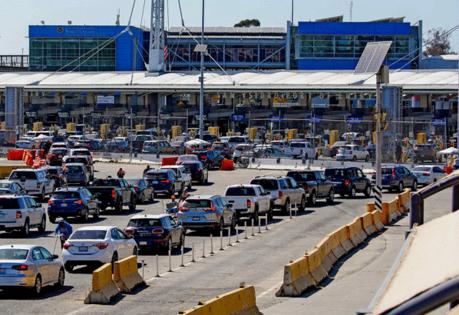Commentary: How a $200 check can put you on a government watch list
Published in Op Eds
More than 1 million Californians and Texans are about to face a new level of financial surveillance from the federal government. Although cash transactions over $10,000 have long been reported under current law, now many transactions of as little as $200 will have to be reported in 30 ZIP Codes along the border with Mexico.
Financial surveillance in the United States has needed reform, but this policy marks little more than another intrusion into the lives of Americans.
The new policy was officially announced by the Department of the Treasury’s Financial Crimes Enforcement Network to “further combat the illicit activities and money laundering of Mexico-based cartels and other criminal actors along the southwest border of the United States.”
Starting in April and continuing at least into September, people in San Diego and Imperial counties in California and in Cameron, El Paso, Hidalgo, Maverick and Webb counties in Texas can expect additional scrutiny when using businesses that provide services such as check cashing, money orders, currency exchanges and money transfers.
Every day, people visit businesses like Western Union and Ria Money Transfer to cash paychecks, send remittances to family or even just exchange unused pesos after a trip to Mexico. Yet people in the designated areas now will be reported to the federal government if they need to send or collect as little as $200 at these businesses.
And as if the $200 mark were not low enough, surveillance also may apply to lesser transactions. The Financial Crimes Enforcement Network noted in its official order that it “encourages the voluntary filing of SARs (suspicious activity reports) where appropriate” to flag attempts “to evade the $200 … threshold.” (It is a crime to knowingly avoid the reporting threshold by breaking up payments or spending less.)
In other words, people could be reported to the government for transactions at $190, $150 or even less. Americans tell pollsters their financial privacy should be protected, in keeping with the 4th Amendment. But under the new order, simple, everyday transactions could put Californians and Texans on a government watch list.
Treasury Secretary Scott Bessent considers such an invasion of privacy “part of a whole-of-government approach to combating the threat” of cartel activity and drug trafficking. “Treasury remains focused,” he said in the announcement, “on leveraging all our available tools and authorities to better identify and counter these criminal activities.”
In Bessent’s defense, organized crime is not easy to stop. However, it’s far more likely that it’s everyone else who will be hit by this policy the most. The reality is that mass financial surveillance is far from effective at fighting crime.
In 2023, United States financial businesses and institutions spent $59 billion on compliance costs to help combat money laundering and other crimes. They filed more than 27 million reports — 20.8 million were about currency transactions that met the $10,000 threshold. Yet despite the billions of dollars spent and the millions of reports filed, the Internal Revenue Service only started 372 investigations into criminal cases that year because of one of those reports.
Expanding this inefficient system is unlikely to have a significant impact on crime, but it is likely to push people further to the financial fringe. Giving businesses a 30-day notice that they need to start reporting customers could mean many of them may either stop serving the designated ZIP Codes or close entirely. For customers — who often have lower incomes — this can mean losing access to what few options were available.
Some businesses may be able to eat the cost given that the policy is set to end on Sept. 9. Still, the Treasury could repeatedly renew the surveillance order for additional 180-day periods if it so chooses. So the road ahead is very much uncertain.
What is certain, however, is that the Treasury’s new policy will undermine financial privacy in a time when more and more Americans are calling to strengthen it.
Americans were upset when the Biden administration tried to make banks report on accounts with just $600 in activity a year, and people were upset when the U.S. Immigration and Customs Enforcement collected records on millions of transactions in California, Texas, New Mexico, Arizona and Mexico.
People should be upset now that the Trump administration wants reports on $200 in activity. It’s time for Congress to establish a proper right to financial privacy that is in line with the 4th Amendment protections many Americans already think they have.
____
Nicholas Anthony is a policy analyst at the Cato Institute’s Center for Monetary and Financial Alternatives.
_____
©2025 Los Angeles Times. Visit at latimes.com. Distributed by Tribune Content Agency, LLC.




























































Comments